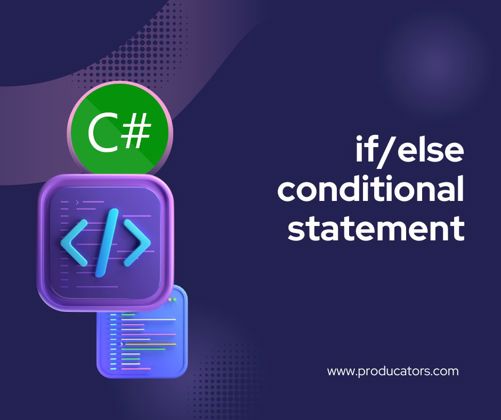
Understanding the if/else Conditional Statement in C#
In programming, conditional statements are critical for controlling the flow of a program based on certain conditions. One of the most commonly used conditional statements in C# is the if/else statement, which allows developers to execute specific blocks of code depending on whether a given condition evaluates to true or false.
In real-life scenarios, conditional logic is used constantly to make decisions. For instance, "If it's raining, take an umbrella. Else, go without one." This is exactly what the if/else statement in C# does—it decides which code to run based on whether a condition is met.
Syntax of if/else in C#
Here’s the basic structure of an if/else statement in C#:
csharp
if (condition)
{
// Code to be executed if the condition is true
}
else
{
// Code to be executed if the condition is false
}
- Condition: An expression that evaluates to either
trueorfalse. - If block: Executed if the condition is
true. - Else block: Executed if the condition is
false.
Example 1: Simple if/else Statement
csharp
int temperature = 30;
if (temperature > 25)
{
Console.WriteLine("It's a hot day, drink plenty of water!");
}
else
{
Console.WriteLine("The weather is cool.");
}
Breakdown:
- If the
temperatureis greater than 25, the message "It's a hot day, drink plenty of water!" will be printed. - Otherwise, the message "The weather is cool." will be printed.
Real-Life Example
Imagine you're at a traffic light:
- If the light is green, you proceed.
- If the light is red, you stop.
Here’s how this logic looks in C#:
csharp
string trafficLight = "green";
if (trafficLight == "green")
{
Console.WriteLine("You can proceed.");
}
else
{
Console.WriteLine("Stop! Wait for the light to turn green.");
}
else if Statement
Sometimes, you need to evaluate multiple conditions. This is where the else if statement comes in handy. You can chain multiple conditions to make more complex decisions.
Syntax of else if:
csharp
if (condition1)
{
// Code if condition1 is true
}
else if (condition2)
{
// Code if condition2 is true
}
else
{
// Code if both conditions are false
}
Example 2: Using else if for Multiple Conditions
csharp
int age = 20;
if (age < 13)
{
Console.WriteLine("You are a child.");
}
else if (age >= 13 && age <= 19)
{
Console.WriteLine("You are a teenager.");
}
else
{
Console.WriteLine("You are an adult.");
}
Here, the code checks multiple conditions to determine whether a person is a child, teenager, or adult.
Real-Life Scenario for else if
Consider a store offering discounts:
- If you spend more than $100, you get a 20% discount.
- If you spend more than $50, you get a 10% discount.
- Otherwise, you get no discount.
This can be expressed in code:
csharp
int totalAmount = 75;
if (totalAmount > 100)
{
Console.WriteLine("You get a 20% discount!");
}
else if (totalAmount > 50)
{
Console.WriteLine("You get a 10% discount.");
}
else
{
Console.WriteLine("No discount available.");
}
Best Practices for if/else Statements
- Keep Conditions Simple: Avoid complex conditions. If a condition is too complicated, consider refactoring it into smaller functions.
- Example: Break down long conditional expressions into meaningful boolean variables.
- Use Ternary Operator for Simple Decisions: For simple
if/elselogic, you can use the ternary operator to make your code more concise.
csharp string result = (score >= 50) ? "Pass" : "Fail";
- Avoid Deep Nesting: Multiple nested
if/elsestatements can make your code difficult to read. Consider using early exits (return,break, etc.) where applicable to reduce nesting. - Short-Circuit Evaluation: In conditions with multiple expressions, C# will stop evaluating as soon as it knows the result. Use this to your advantage for performance optimizations.
csharp
if (x != 0 && y / x > 1)
{
// Safe because x != 0 is evaluated first
}
- Use
elseOnly When Necessary: If the condition can be inferred from the firstifstatement, you may not need anelseblock.
Features of if/else Statements
- Conditionally Executes Code: Allows your program to take different actions based on conditions.
- Supports Multiple Conditions: You can chain multiple
else ifblocks to check multiple conditions. - Handles Logical Operators: Conditions can use logical operators such as
&&(AND),||(OR), and!(NOT). - Ternary Operator Support: For compact
if/elselogic, C# provides the ternary operator? :. - Short-Circuit Evaluation: When evaluating complex conditions, C# stops checking conditions as soon as the result is determined.
Build a Simple Application
Let's build a simple console-based grading system using if/else statements. The system will prompt the user to enter their score and will return a grade based on the score.
csharp
using System;
public class GradingSystem
{
public static void Main(string[] args)
{
Console.WriteLine("Enter your score: ");
int score = Convert.ToInt32(Console.ReadLine());
if (score >= 90)
{
Console.WriteLine("Your grade is A.");
}
else if (score >= 80)
{
Console.WriteLine("Your grade is B.");
}
else if (score >= 70)
{
Console.WriteLine("Your grade is C.");
}
else if (score >= 60)
{
Console.WriteLine("Your grade is D.");
}
else
{
Console.WriteLine("Your grade is F.");
}
}
}
Explanation:
- The user is prompted to enter their score.
- Depending on the score, the program will return a grade ranging from A to F.









